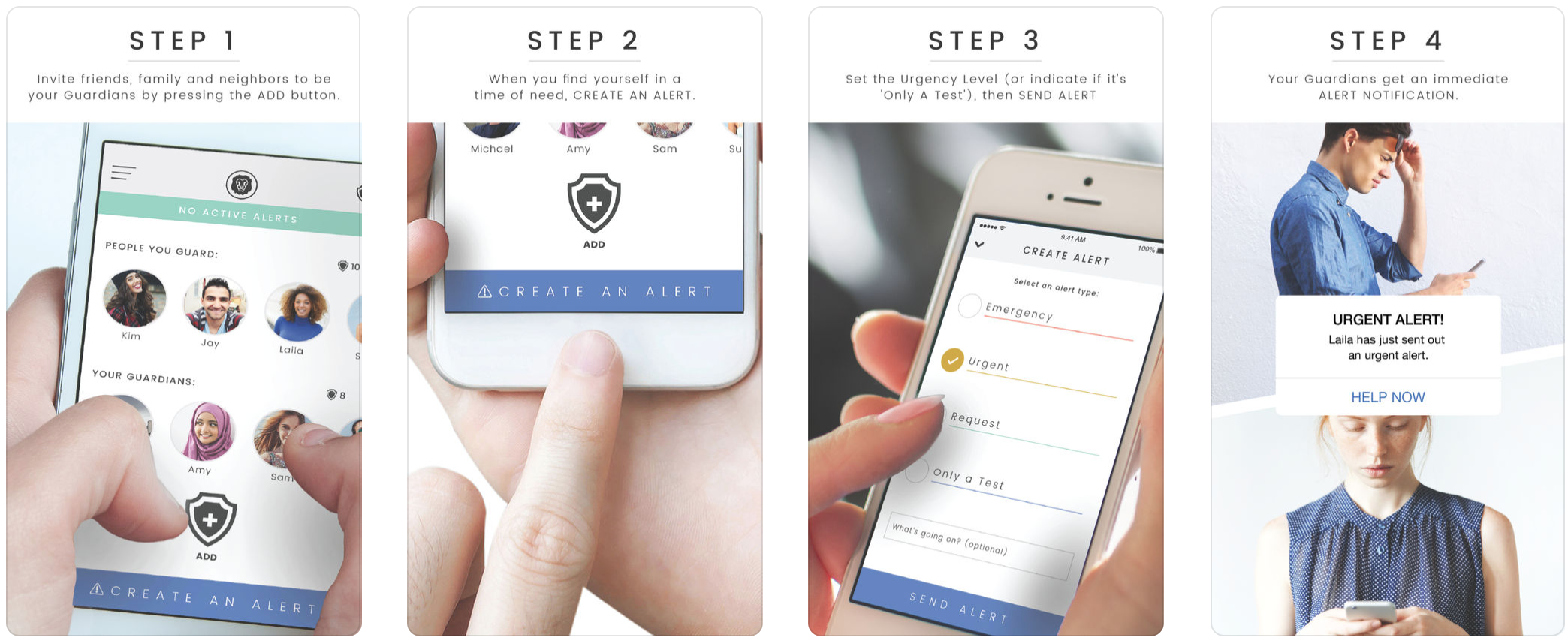Mark Jeffrey traces the origins of Guardian Circle—the 911-type emergency service he’s building—to the day he received some garbled text messages from his girlfriend. He went to her house and found her on the floor of her garage, experiencing what appeared to be a stroke. “She could barely talk, half her body had shut down, and she was blind in one eye,” Jeffrey recalls. He rushed her to the hospital, where doctors determined that she was experiencing a type of migraine that often presents as a stroke.
“She’s fine—I always feel like I need to add that when I tell the story,” Jeffrey says. “But what if it had been a stroke? Timing would’ve been everything. If she hadn’t gotten to the hospital, she would’ve died. I later found out that help was all around her. There were, like, eight people she knew within a thousand yards. I figured there was an app for this. There were a lot of panic-button apps, but nothing that put together a map and an alert system, and organized a response.”
Billions of people on earth have no 911.
Jeffrey, author of two books about bitcoin, decided to create an alert system based on blockchain technology. A Guardian Circle user assembles networks of people who receive an alert when the user is in trouble. The alert, along with useful personal information, is stored on a blockchain. The system runs on the company’s tokens, which can be purchased or earned by signing up new users, and also used as tips to reward responders who heed the user’s call. Is the world ready for a 911 that’s global but decentralized, altruistic yet tokenized? BREAKER approached Jeffrey, a web entrepreneur with a series of successful startup exits, with questions. This interview has been edited for length and clarity.
 An emergency response system seems necessarily centralized. We call a central authority, which then dispatches help.
An emergency response system seems necessarily centralized. We call a central authority, which then dispatches help.
Exactly. It’s very centralized—and very fucked-up a lot of the time. The personal alert emergency system worldwide is antiquated, corrupt, or nonexistent. Billions of people on earth have no 911. There is no magic number they can call when bad things happen. In the U.S., 911 sucks. It’s 1968 technology that hasn’t been upgraded since. There are a million things wrong with it, but the biggest is that operators don’t know where you are if you’re using a mobile device.
Our solution is to start from scratch. Reboot it all. Make it something that’s location-aware and uses the cloud, and make it for the whole world, so that no matter where you are on earth, all you do is push a button.
Doesn’t the Federal Communications Commission require that mobile phones transmit their location during 911 calls?
It’s called “Enhanced 911,” but there are a lot of problems with it. What often happens is calls get routed to 911 centers based on the location of the cell that transmits the call, which might be in a different jurisdiction, so the call has to be transferred to the correct center, which wastes time.
I’ve found that the EMT’s themselves are pissed—they’re horrified by the universe they’re forced to operate in. For example, if they’re transporting a patient for [a minor injury], if they go by someone who’s dying, they can’t stop. Which is just fucking stupid. But that’s the rules of the world we live in.
I did talk to the guy who ran the 911 system for the state of Kentucky, and got into crypto late in life. He stumbled across us and said “oh my god, this is the best thing I’ve ever seen. But for most people entrenched in the 911 community, it’s very clubby. You’re dangerous for trying to innovate.
Here’s another thing people don’t think about. If you call an ambulance, you’ve just incurred a bill for thousands of dollars. People with non-life-threatening injuries are taking Ubers to hospitals. They’re just like, “fuck it,” because they know about that bill. And other people who are dying aren’t calling 911 because they don’t want that ambulance bill. They’re thinking, “well, maybe I should just die rather than saddle my son or daughter with some crazy bill.” The whole system is fucked from beginning to end.
The circle of responders can be scattered all over the world, and the map lets you see where everyone is when an alert goes out. But what can I do to help if I’m nowhere near the person in trouble?
You’re response might be “it looks like four of you are going,” and you’re done. There’s a chat room that appears that lets you all coordinate with one another to figure it out.t. If all you do after receiving an alert is call 911 and report where the person is, because 911 doesn’t automatically know where they are, that in itself is extremely valuable. Eventually, I do want actual 911 [responders] on our grid. There’s no reason they shouldn’t be. I’m just trying to provide a richer grid. Neighborhood Watch is an augmentation of the police. The Cajun Navy is all about rescuing people. There are precedents.
"We’re Uber-izing emergencies, sort of."
What role do the tokens play?
It’s part of the notification. You might get a message that Mark sent out an alert and there’s 200 tokens up for grabs. Maybe you say ‘yeah, I don’t care, 200 won’t get me out of bed.’ Or maybe you say ‘sure, ‘I’ll say yes.’ After the alert is over, the alerter gets a tip screen that shows everyone who answered the call. Did you put on the Bat-suit and slide down the pole? Great, you get some. Maybe Jane Doe did the most—she’s an EMT who showed up in three seconds, so maybe she gets the most. We’re very consciously copying the feel of Uber. We’re “Uber-izing” emergencies, sort of.
I know there are ways to earn the tokens other than purchasing them, and you’re hoping that philanthropic efforts develop that would get tokens to those who can’t afford them. But why include the crypto element at? Couldn’t a system like this work without it?
Doing this in the token world gives us more degrees of freedom. Tokens are international money. On top of that, I want to create a dynamic where responders feel like they’re getting bitcoin in the early days. They’re motivated to collect as many as possible. We want people who bet early on this crazy idea to benefit when the ecosystem expands. At scale, if we become the new 911 grid for the world, which I think is possible, these tokens will be worth a lot. If you get ‘em when they’re ten cents each—holy shit!
 You’re partnering with the Women’s Safety XPRIZE in India. Are they interested in the tamper-proof aspect of the alerts, since Guardian Circle is blockchain-based?
You’re partnering with the Women’s Safety XPRIZE in India. Are they interested in the tamper-proof aspect of the alerts, since Guardian Circle is blockchain-based?
Correct, that’s hugely important. In India, when a woman is sexually assaulted and she calls the cops, often the cops assault her, because their thinking is “why the fuck not—she’s already ruined.” That’s how they think. How do you solve a problem like that? The answer isn’t more cops. So now if the cops come, you have a record: “I did get assaulted.” Those corrupt cops can’t erase it.
So it’s about providing a new way for people to bear witness, even in places where 911 exists. In this country, for example, we have a persistent problem of police cameras mysteriously malfunctioning during critical encounters. Could this help?
Yeah, without a doubt.
On the other hand, police could just take away someone’s phone before the person has a chance to send out an alert.
That’s true—if you’re being assaulted, the phone isn’t a very good alert device. But if you’re wearing a ring with a button on it and nobody knows you’re pressing a button, that’s a better way. That’s why the system allows for IOT manufacturers to stake tokens and plug in their devices. We have a lot of people coming to us who say they run a resort, campus, or hospital, and they want to receive alerts that occur within their geofence. And we say “that’s great-stake tokens and we will give you access to all alerts declared on your property.” The idea here is we all grow the ecosystem. It’s ours together, and if you help develop it, you should get rewarded.
It seems like what you’re ultimately attempting is a private-sector overhaul of a public-sector good.
That’s exactly what I’m trying to do. I’m either crazy as fuck and this will never work, or it’ll be awesome.